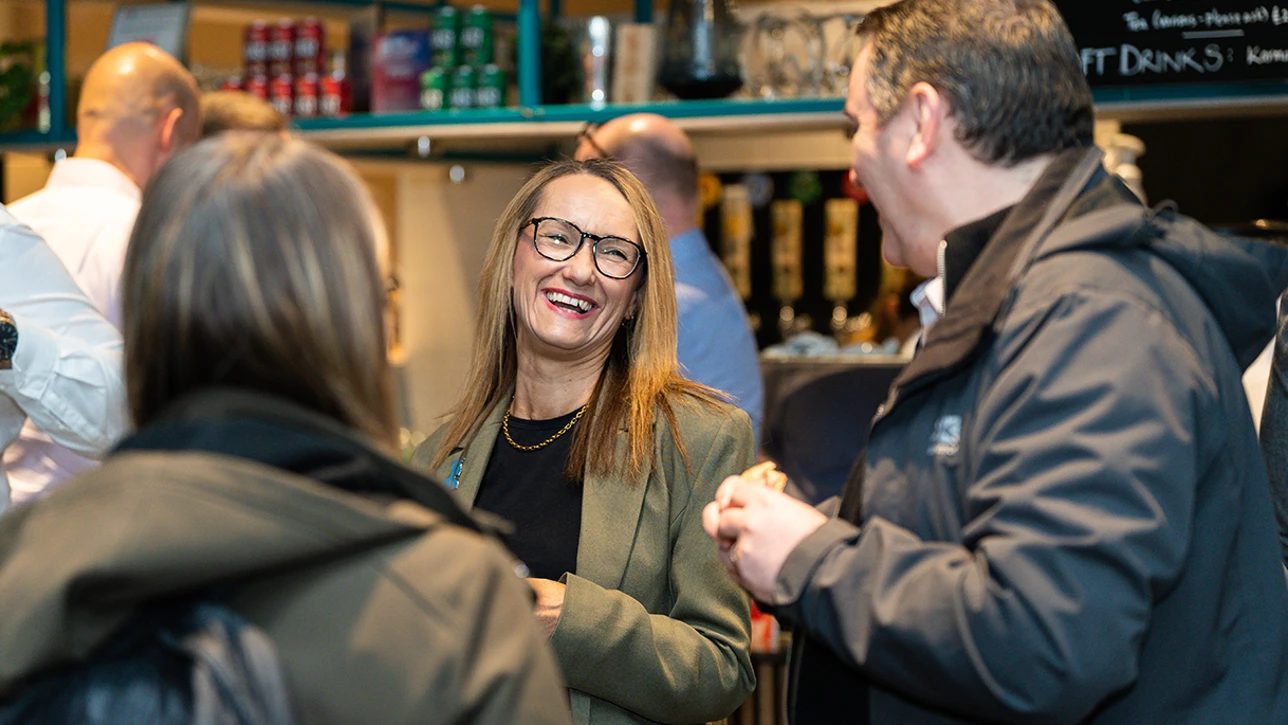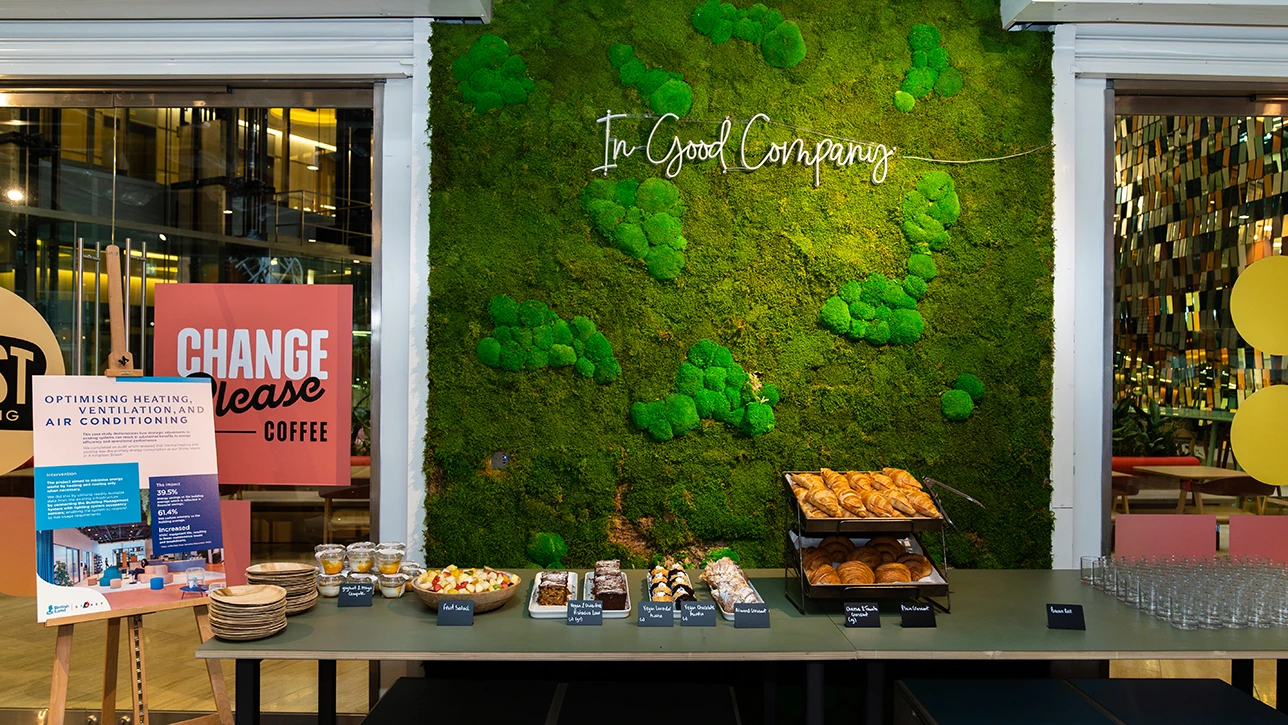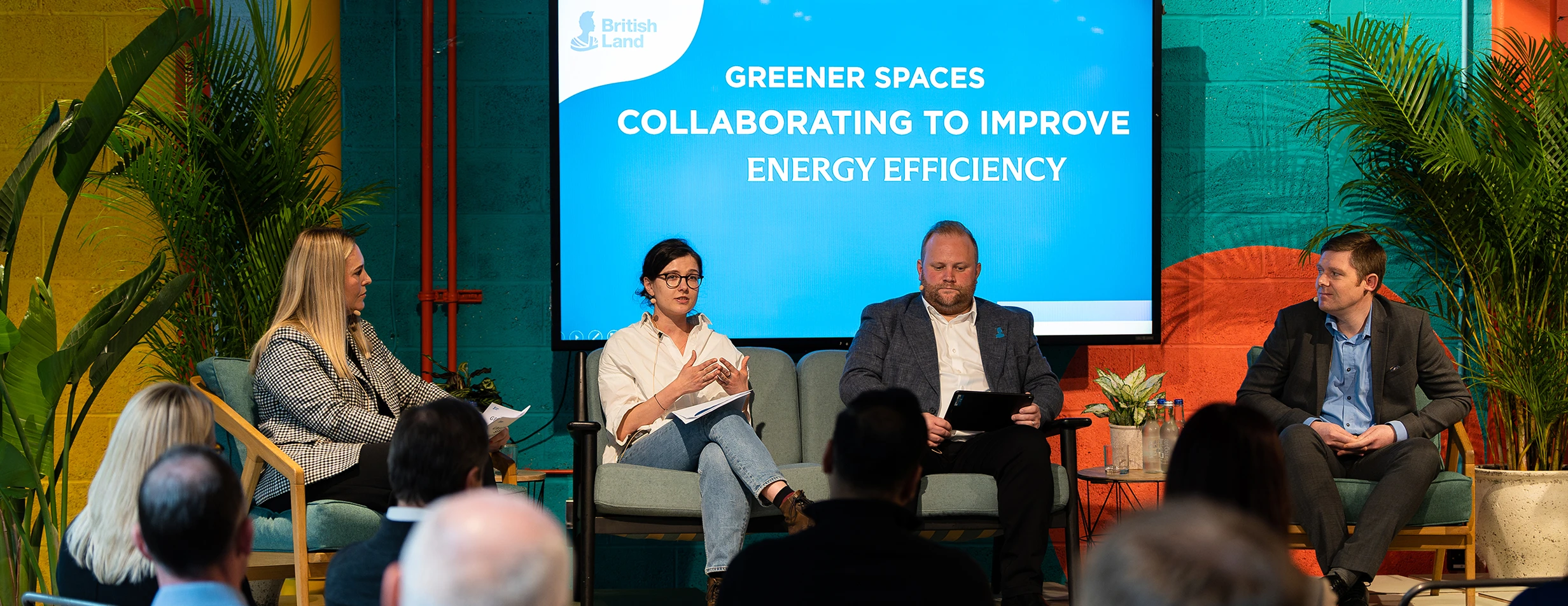In March 2024, over 70 of our customers, partners and colleagues came together to explore how businesses can successfully improve energy efficiency across their office space. They heard from the British Land team and leading experts at Mitsubishi and EP&T Global through presentations and a panel discussion, followed by networking.
Supporting climate goals
Matt Webster, our Head of Environmental Sustainability, kicked off the event by raising the urgent need for action, the progress British Land has made with customers and what’s needed next to achieve climate goals. He shared that recent reports raised that there is a 66% chance that global temperatures will breach the 1.5°⁰C limit (above pre-industrial levels) by 20271 and that 2023 was by far the hottest year on record2. Energy use in offices has a big role to play, with the built environment currently responsible for 39% of global energy- related carbon emissions, and operational emissions account for 28% of this.3
Matt highlighted potential ways in which we can collectively drive change. Collaborating with customers, we have improved operational carbon intensity across our office portfolio by 40% since 2019 – one way this has been achieved includes retrofitting 20 heat pumps since 2014. This dramatically cuts customers’ carbon footprints, supports their climate goals and reduces energy bills;, a customer previously commented: ‘real estate is one of the bigger levers we can pull to achieve net zero’.
Improving energy efficiency in your workspace
Leading experts from British Land, Mitsubishi and EP&T Global came together for a panel discussion on potential solutions. Data was a big theme – you can’t manage what you don’t measure. All the panellists gave proven examples of data driving significant energy savings – from fine-tuning settings to quickly identifying and fixing faults that waste energy. Optimising existing systems can cut energy use by 25%, and while light retrofit measures can save another 20%. This would take us a long way towards the 60% energy reduction we all need to achieve by 2050.
Everyone agreed that collaboration is key. Where customers have integrated their BMS with British Land’s landlord systems, energy use has reduced by 38%. Collaboration and action are particularly important in big offices, Chris Newman from of Mitsubishi Electric recalled that commercial buildings over 1,000sqm make up just 6% of non-domestic buildings nationally but are responsible for more than 60% of energy use.5
How tech can drive energy efficiency
Fiona Sawkill, our Head of Digital Placemaking, revealed how My Building, British Land’s smart building platform, is driving energy efficiency by providing insights on the health of facilities and automating building systems. After a successful pilot in Storey, our flexible workspace offer at 100 Liverpool Street, Broadgate, we’ve now rolled this out to a further three buildings.
My Building pulls together a wealth of data into a ‘single source of truth’ dashboard, giving us new insights to improve building performance – from understanding how occupancy affects energy, to knowing exactly how much energy is saved by every intervention we make. These include activating night modes as soon as rooms are empty and using ‘daylight harvesting’ on sunny days, by regulating lighting near windows and skylights to utilise the extra sunshine.
Using My Building, we’ve switched from traditional time-schedule operations to occupancy-based, where lighting, heating and cooling automatically adjust, based on whether anyone is in the space. This can reduce energy use for HVAC by 35% and for lighting by 24%. Tickets are immediately issued for potential faults – often before customers are even aware – detailing the fault location and likely root cause. This saves investigation and admin time for our engineers, freeing them up to focus on higher- value activities for customers.
The time for action is now
During the Q&A, panellists dispelled common myths. Contrary to what one people might think, results across multiple British Land buildings prove that the right air source heat pumps, when well-managed, can extract enough warmth from outside air to heat workspaces, even on a freezing London day.
Panellists also raised the need to challenge temperature norms for workplaces. Australian offices save huge amounts of energy by adjusting temperatures a couple of degrees with the seasons, slightly warmer in the summer and slightly cooler in the winter. British Land is keen to trial this with interested customers.
In his closing remarks, our Chief Operating Officer, David Walker, highlighted how collaboration is essential in this space, whether it’s retrofitting air source heat pumps to removeing gas or sharing energy data and integrating building systems to find efficiencies.
Chris Newman reminded us all that, with only around 300 pay days until the 2050 net zero carbon deadline, the time for action is now.
Do you want to improve the energy efficiency of your space? Could our My Building platform support you? Please get in touch: sustainability@britishland.com
Networking
Over 70 customers, partners and colleagues attended and stayed for networking, including facilities managers, senior engineers, property managers, heads of workplace and office services managers.

Over 70 customers, partners and colleagues attended and stayed for networking, including facilities managers, senior engineers, property managers, heads of workplace and office services managers.
Good Company Café
The event was hosted at Good Company Café, Regent’s Place, where 100% of profits from coffee sales help people experiencing homelessness, breakfasts are sourced from a social enterprise helping refugees, and furniture is upcycled.

The event was hosted at Good Company Café, Regent’s Place, where 100% of profits from coffee sales help people experiencing homelessness, breakfasts are sourced from a social enterprise helping refugees, and furniture is upcycled.
For more on our sustainability strategy Greener Spaces, Thriving Places, Responsible Choices, visit: www.britishland.com/sustainability
1 World Meteorological Organization: Global Annual to Decadal Climate Update 2023
2 World Meteorological Organization: State of Global Climate Report 2023
3 Global Alliance for Building Construction: Global Status Report 2018
4 UK GBC: Net Zero Carbon: Energy Performance Targets for Offices 2020
5 BEIS: Non-Domestic National Energy Efficiency Data-Framework (England and Wales) 2022


